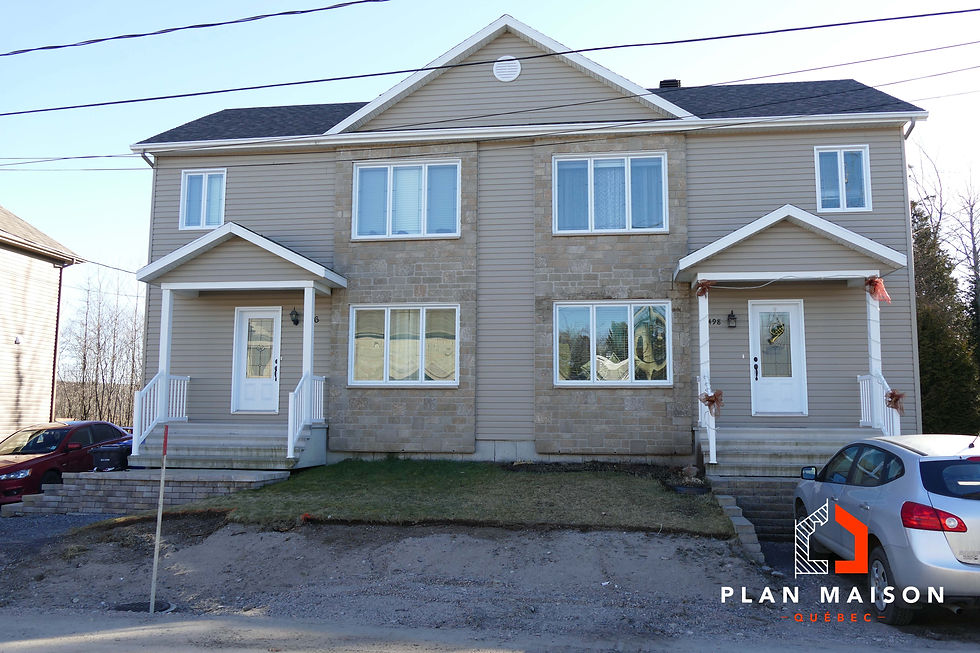Understanding the Administrative Housing Tribunal (TAL): a must in Quebec
- coraliefortin076
- Jul 1
- 6 min read

In Quebec, the relationship between landlord and tenant is governed by a well-defined legal structure. The Tribunal administratif du logement (TAL) of Quebec, formerly known as the Régie du logement, plays a fundamental role in managing this relationship. Much more than a simple arbitrator, it is an essential institution to understand, whether you are a tenant, landlord, investor, or even a future builder.
At Plan Maison Québec, we assist hundreds of clients each year who, as part of a construction or renovation project, are wondering about the legal implications of residential rentals. Understanding what the TAL is, how it works, and how it affects you is therefore essential.
What exactly is TAL?
The Administrative Housing Tribunal (TAT) is a specialized tribunal that adjudicates exclusively disputes related to residential rentals. Its mission is to ensure fair, impartial, and timely resolution of disputes between landlords and tenants. It enforces the Civil Code of Quebec, in its section on residential leases.
This institution aims to restore balance to an often asymmetrical relationship by providing both parties with a neutral space to assert their rights. Whether it's a newly finished basement unit, a condo, a duplex apartment, or even a cottage converted into a seasonal rental, the TAT has jurisdiction as long as the dwelling is used for residential purposes.
If you are planning to build an apartment building or renovate a house for rental purposes, like many Plan Maison Québec clients, it is crucial to understand your legal obligations and the dispute resolution mechanisms available to you.

Why is TAL essential for owners?
For landlords or future landlords, the TAL represents a legal safety net. It allows them to take action when a tenant fails to meet their commitments: unpaid rent, major damage, refusal to vacate the property after legally serving notice, etc.
Thanks to Plan Maison Québec, several clients have been able to have plans drawn up for converting their basement, garage, or annex to create a rental unit. However, some of them encountered problems once the premises were occupied. In these cases, the TAL often becomes the primary recourse to regularize the situation.
The Court can also intervene in cases where a property is repossessed to accommodate a family member or to carry out major renovations. However, these steps must be taken with care, as misinterpreting deadlines or justifications can lead to refusals or even prosecution.

An institution also at the service of tenants
The TAL isn't just for landlords: it also protects tenants from abuse, unreasonable rent increases, illegal evictions, substandard housing, or unsafe living conditions.
If you're a tenant in a property newly renovated or built using Plan Maison Québec, you have guaranteed rights. For example, your rent cannot be increased without respecting the prescribed deadlines and providing justifications. You also have the right to a safe and sound home, with working heating, plumbing, and electrical systems.
The TAL therefore allows everyone to live within a clear legal framework that values mutual respect and responsibility.

The central role of the lease
The residential lease is the legal document that governs the rights and responsibilities of both parties. It is a key document in any appeal before the TAL (Local Administrative Tribunal). This contract must be clear, detailed, and comply with the legally prescribed templates.
At Plan Maison Québec, we recommend that all our clients who wish to rent a newly constructed home take the time to draft a solid lease. It is even advisable to consult a legal advisor to include clauses specific to your situation.
A well-drafted lease can, for example, govern future renovations, usage limits (such as a prohibition on subletting), or the presence of pets. In the event of a dispute, the TAL will give considerable weight to the clauses contained in this document.

Steps to take to appeal to the TAL
One of the advantages of the TAL is its accessibility. Whether you are a tenant or a homeowner, you can easily initiate proceedings without a lawyer. Simply complete an application online or on paper, pay the required fees, and attach the relevant documents.
After filing, a hearing is scheduled, usually a few weeks or months later. Each party can represent themselves, present witnesses, submit evidence, and question the other party. The administrative judge then issues a written, binding decision.
This simplicity allows homeowners, even beginners, such as those who have just completed the construction of their house with Plan Maison Québec, to access justice without being deterred by legal complexity.

Deadlines and urgency: what you need to know
Certain cases are handled as a priority by the TAL, particularly those involving:
Lack of heating during the winter
Dangerous or unsanitary conditions
Illegal evictions
Acts of harassment
It is therefore essential to act quickly if you find yourself in a critical situation. As a homeowner, it is also wise to carefully document all communications, work, and payments. The renovation plans drawn up by Plan Maison Québec, along with proof of compliance, can also serve as supporting documents before the Court.

The role of TAL in residential construction
Although the Administrative Housing Tribunal (THI) primarily intervenes once a home is occupied, it also plays an indirect but important role during the construction phase. Indeed, the THI establishes the legal guidelines that builders and future owners must comply with if they intend to rent a home once the work is completed. This includes compliance with habitability standards, minimum floor area, room layout, ventilation, heating, and insulation.
At Plan Maison Québec, we integrate these requirements from the design stage so that our clients can avoid future disputes and ensure that their buildings are eligible for residential rental.
Furthermore, in the event of major work requiring the temporary eviction of existing tenants, the THI must be consulted to authorize certain procedures. This demonstrates how crucial a thorough understanding of the THI's role is, even before the walls of a project are erected.

TAL, duplex and triplex: rental accommodation under surveillance
Duplexes and triplexes, very popular in Quebec, are an excellent option for owners who want to live in their building while generating rental income. These shared dwellings, often built or renovated using the Quebec Home Plan, are directly regulated by the Administrative Housing Tribunal (TAT) as soon as one of the units is rented.
This means that the same rules for setting rent, maintenance, repossession, and eviction apply, regardless of the number of units. Many owners are unaware that they cannot, for example, repossess a unit at will: the repossession request must meet specific conditions, particularly if the tenant is elderly or has lived there for several years.
Furthermore, the sharing of spaces (yard, parking, entrance) can be a source of conflict, which only the TAT is authorized to resolve impartially. This is why it is essential, from the design stage of your duplex or triplex, to plan a clear layout of private and common areas. Plan Maison Québec can help you design a plan that minimizes the risk of litigation while maximizing everyone's comfort.

TAL in the digital age: towards better accessibility
In recent years, the TAL has been modernizing its services. It is now possible to file applications online, attend virtual hearings, and track the progress of your case via a secure portal. This digital transformation makes the Tribunal more efficient and accessible.
For Plan Maison Québec clients located in remote areas or outside major cities, this development is excellent news. You can manage your rental issues remotely, without having to travel to Montreal or Quebec City.
This also allows for greater transparency: decisions are published and available for consultation, allowing you to learn about cases similar to yours.

The impact of the TAL on the Quebec rental market
The TAL is more than just a court: it plays a key role in regulating the real estate market. By ensuring a balance between the interests of tenants and landlords, it helps maintain the stability of the rental market.
In a context of housing scarcity and rising prices, several TAL decisions have set precedents and influenced practices in the sector. For example, a landlord cannot simply double the rent after renovations, even major ones, without adequate justification.
Plan Maison Québec clients investing in housing construction must therefore keep in mind that their projects must comply with the TAL's guidelines, particularly with regard to rent setting and renovations.

Conclusion: Administrative Housing Tribunal in Quebec
Understanding the Administrative Housing Tribunal isn't just about learning about an institution; it's about equipping yourself with practical knowledge to secure your real estate investment or defend your rights as a tenant. Whether you're building a cottage, adding a dwelling to your primary residence, or planning an income-generating property, a good understanding of the TAL rules is essential.
At Plan Maison Québec, we go far beyond simply designing plans. We support your projects with a comprehensive approach: aesthetic, technical, and legal. Our experts are there to advise you and help you anticipate constraints.juridiques, et vous offrir des solutions concrètes, réalistes et personnalisées.
Don't wait until a dispute arises to find out.



댓글